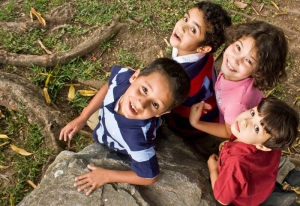New Grant Will Help Vulnerable Children Beat the Odds
November 10, 2015 / by Joanna Scott- Giving
A $500,000 grant from the Robert Wood Johnson Foundation will support a new program of research at the USC School of Social Work to identify community assets that support pathways to resilience for young children and their families.
Under the direction of Emily Putnam-Hornstein, assistant professor at the USC School of Social Work, and Rhema Vaithianathan, professor at Auckland University of Technology, the study will utilize information available for analysis through the USC Children’s Data Network (CDN) to develop statistical models that characterize children who are at higher risk for negative outcomes. Data will then be aggregated to identify clusters of children where observed rates of adversities are significantly lower than expected, which may indicate protective factors operating at the community level.
The project will use four sources of administrative records: birth, child protection, developmental service and death. Additionally, geographic data sources will be incorporated to provide evidence of community resources that help to offset child risk.
“With support from the Robert Wood Johnson Foundation, this project will allow the CDN to expand and extend administrative record linkages with a focus on geospatial clustering of children in California,” Putnam-Hornstein said.
The size and scope of the data used in this project will be distinctive, involving more than seven million longitudinal child records. For each child, data will be modeled based on demographic/health characteristics at birth and adverse childhood outcomes (i.e. maltreatment, developmental disability and death). The project will examine how childhood adversity rates have changed in communities over time and highlight communities where children are experiencing better than expected outcomes despite high adversity burdens.
In the context of communities, neighborhood advantages may offset individual threats. “This project serves as a unique proof of concept for the large-scale linkage of administrative data as a tool for developing place-based initiatives, allocating resources, and understanding the protective role communities may play in preventing childhood adversities,” Putnam-Hornstein said.
The initiative is part of the Robert Wood Johnson Foundation’s commitment to building a Culture of Health – one in which all Americans can live their healthiest life, no matter the income, education or zip code. Identifying community-level factors that promote child resilience is a key step in addressing the root causes of adversity; elevating social and emotional well-being; and ultimately giving children the tools they need to become healthy, resilient adults.
By identifying communities in which children are “beating the odds,” this project is a first step to recognizing characteristics that can produce positive outcomes for children at risk within their respective communities.
The USC Children’s Data Network (CDN) is funded through grants from First 5 LA and the Conrad N. Hilton Foundation.
To reference the work of our faculty online, we ask that you directly quote their work where possible and attribute it to "FACULTY NAME, a professor in the USC Suzanne Dworak-Peck School of Social Work” (LINK: https://dworakpeck.usc.edu)
